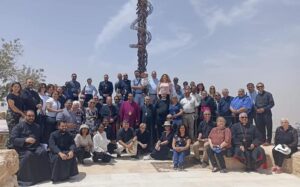By John Holdsworth, Canon Theologian at Nicosia Cathedral
In her best-selling novel, “The Giver,” made into a film in 2014, children’s author Lois Lowry describes a dystopian community in the year 2048 (cf 1984). The striking characteristic of this community is that it has abolished pain. Pain is no more. Tears have been wiped from eyes. Lots of Christian echoes there. Hurrah, we may say, but a price has been paid for this achievement. In order for there to be no suffering, there are three more conditions. This is a society without choice. All the choices are made by a faceless group and communicated electronically. It is a society in which relationship is forbidden. From puberty, people have to take medication to suppress any impulses in that direction. Children are born, but at the decision of the faceless group, and without any intervention that could be called ‘loving.’ Euthanasia is practised on the old. The third thing that has been sacrificed is memory.
We can see the logic behind this. Wrong choices, sometimes deliberate and what Christians might call sinful, are often at the heart of the causes of suffering. Anyone who has loved knows also what it is to suffer, even if the suffering results from the loss of the loved one. And memory is what prevents us living entirely in the moment. It recalls past suffering, and linked with relationship, brings to mind lost joys.
The author is on the one hand, to an extent, analysing suffering and its causes, but on the other is making a profound point about what it is to be human. Without relationship, without choice and without memory she is saying that we are no longer recognizable as such. This accords with our recent experience of lockdowns. Choice was taken away from us. In some places permission had to be sought even to move outside our own property. Relationship was impossible. Apart from the growing culture of ‘my neighbour is my enemy’, legal restraints meant that meetings between family members, lovers, social groups could not occur. We lost all sense of time as familiar landmarks of memory were taken away. And for many of us that made us feel less then human and taught us valuable lessons about what that means.
More profoundly still the author is saying that suffering is part of the human condition; and should be accepted as such. The appropriate response to suffering is not necessarily to ask, ‘why?’ in a way that often seeks a moral cause and can lead to a kind of Christian masochism that holds a picture of the worthlessness of humanity as its paradigm, as in some branches of Christianity. The appropriate response, in the first place is to activate our relationship possibility of caring. As Paul puts it in 2 Corinthians “He consoles us in all our troubles, so that we in turn may be able to console others in any trouble of theirs, and to share with them the consolation we ourselves receive from God” (2 Corinthians 1:4). Interestingly the word for consolation is the same word in Greek that gives us the description of the Holy Spirit as Comforter.
Memory is not only vital in its relation to suffering. Without memory we cannot learn, cannot reflect, cannot gain perspective, cannot grow in understanding. This is a season of remembering: saints, the departed, the fallen and injured in battle. In Cyprus we remember a time when Greece said ‘no’ to Mussolini. In the UK we remember an attempt to destroy democracy by blowing up the king and parliament. But every week we have a ceremony to remember, which we call the Eucharist. It is a time to celebrate our humanity as we encounter the risen, once incarnate, Christ. That memory recalls suffering but it is also the foundation of our hope. It is a celebration of God’s gifts. Memory, however painful, is one of them.
Image: Felix Mittermeier


